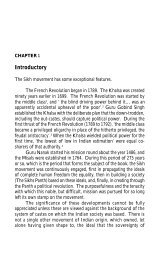Fundamentalism and the Sikh Religious Tradition by T.N. Madan
Fundamentalism and the Sikh Religious Tradition by T.N. Madan
Fundamentalism and the Sikh Religious Tradition by T.N. Madan
You also want an ePaper? Increase the reach of your titles
YUMPU automatically turns print PDFs into web optimized ePapers that Google loves.
which in <strong>the</strong> Hindu systems were considered pariahs. He never punished anyone with<br />
death sentence, not even those who had made murderous attempts on his life.<br />
In <strong>the</strong> same century Shivaji <strong>and</strong> Mahrattas made a strict revival of Hindu<br />
ideology including <strong>the</strong> Caste system. As is <strong>the</strong> Hindu tradition, he kept Brahmin Peshwas<br />
as his Ministers. A Hindu King in his administration has to see that all social <strong>and</strong> civil<br />
rights <strong>and</strong> practices, are strictly in accord with <strong>the</strong> Caste rules." Accordingly, <strong>the</strong><br />
appearance of <strong>the</strong> Scheduled castes like Mahars <strong>and</strong> Mangs on <strong>the</strong> streets of Pune, was<br />
banned before 9 A.M. <strong>and</strong> after 3 P.M., because <strong>the</strong>ir long shadows<br />
defiled <strong>the</strong> higher castes, especially Brahmins." Shivaji's circular letter enjoined on all<br />
members of <strong>the</strong> society not to make any innovations in Caste practices, but to follow <strong>the</strong><br />
traditional path prescribed <strong>by</strong> <strong>the</strong> Shastras.<br />
Ano<strong>the</strong>r significant achievement of <strong>the</strong> <strong>Sikh</strong> Revolution is reflected in <strong>the</strong><br />
sacrifices <strong>the</strong> <strong>Sikh</strong> community made in <strong>the</strong> struggle for Indian freedom. Among <strong>the</strong> 121<br />
hanged, 2646 imprisoned for life, <strong>and</strong> 1300 killed at <strong>the</strong> Jallianwala Bagh, 93, 2147 <strong>and</strong><br />
799, respectively, were <strong>Sikh</strong>s. Fur<strong>the</strong>r, in modern India, a major encroachment on Indian<br />
freedom, was made <strong>by</strong> enforcement of Emergency in 1975 <strong>by</strong> Indira G<strong>and</strong>hi. Whereas no<br />
organised protest was made <strong>by</strong> any section of <strong>the</strong> Indian community anywhere in India, it<br />
was <strong>the</strong> <strong>Sikh</strong>s who conducted a morcha (an agitation) from <strong>the</strong> precincts of <strong>the</strong> Golden<br />
Temple, involving imprisonment of over 40,000 volunteers. This is what Vijayalakshmi<br />
P<strong>and</strong>it, Jawahar Lal's sister <strong>and</strong> former Indian Ambassador to U.S.A., stated:<br />
"Punjab which had always been in <strong>the</strong> forefront of resistance to oppression kept<br />
its colour flying during <strong>the</strong> EMERGENCY also. It was in Punjab <strong>and</strong> Punjab alone, that a<br />
large scale resistance was organised against it. The worst thing that happened during <strong>the</strong><br />
emergency was that a<br />
brave nation was frightened into submission, <strong>and</strong> no body spoke, except in hushed tones.<br />
In Dehra Dun, where I was, I hung my head in shame, <strong>and</strong> wondered if this was <strong>the</strong><br />
Bharat for-which we, <strong>the</strong> freedom fighteres, had suffered. Even those, not actually in<br />
prison, were no less in jail. Only in Punjab <strong>the</strong> Akalis organised a morcha against this.<br />
Punjab's lead in such matters should continue."<br />
All this is to emphasize that making sacrifices for <strong>the</strong> love of freedom or<br />
confrontation with injustice in <strong>the</strong> socio-political field, is a fundamental objective in <strong>the</strong><br />
<strong>Sikh</strong> ideology, <strong>and</strong> for that matter, in any whole-life religion. It would, thus, be a<br />
misslatement to call it <strong>Fundamentalism</strong>. The struggle of <strong>the</strong> <strong>Sikh</strong>s for <strong>the</strong>ir own rights<br />
since 1947 or during <strong>the</strong> Emergency for <strong>the</strong> suppression of human rights in <strong>the</strong> country as<br />
a whole, has, thus, been a part of <strong>the</strong>ir sanctioned ideology, which is far from being in<br />
any sense fundamentalist or anachronist.<br />
III. INDIAN SECULARISM<br />
Indian Secularism has nothing to do with what is known as Secularism in <strong>the</strong><br />
West. Let us see <strong>the</strong> realities <strong>and</strong> its history. The Indian problem is <strong>the</strong> problem of <strong>the</strong><br />
Hindu society. The undisputed scriptures of <strong>the</strong> Hindus, <strong>the</strong> Vedas <strong>and</strong> <strong>the</strong> Upanishads,<br />
give sanction to <strong>the</strong> Caste ideology. The great Bhagwad Gita, which embodies <strong>the</strong><br />
philosophy <strong>and</strong> guide of most Hindus, clearly sanctions castes (varnas) as <strong>the</strong> creation of<br />
<strong>the</strong> Lord, <strong>and</strong> prescribes rigid immobility of caste divisions. The religious goal in<br />
Hinduism is personal moksha. The Hindu system, except for <strong>the</strong> Caste norms <strong>and</strong> duties,<br />
prescribes no social duties or general morality. Maitra, as stated already, finds that all<br />
Hindu ethics is super-moral. The distinguished framer of <strong>the</strong> Indian Constitution,
















